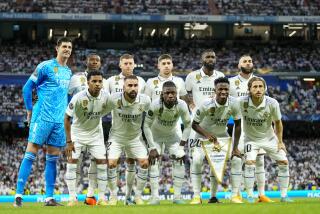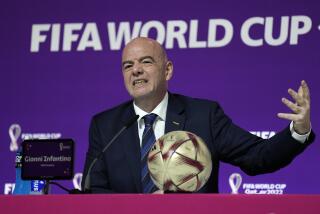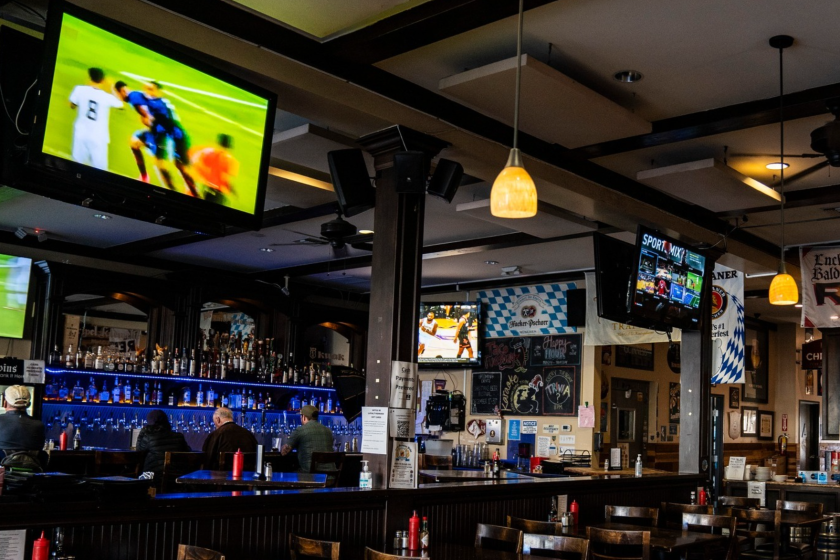Europe’s Soccer Barons Paying Princely Sums
For the fans, it’s the sport that matters. They care about what occurs on the field and, occasionally, what the players are doing off it.
For the owners, the sport is something different altogether--more like Monopoly, only with real money and real people.
In the past few weeks, staggering sums have changed hands among Europe’s top clubs as wealthy owners have moved the pieces around the board.
First, Gabriel Batistuta was shifted from Fiorentina to AS Roma in May for the not untidy sum of $33.8 million. He will like it just as much in Rome as in Florence, especially considering that he’ll be earning $7.15 million a year and playing for a team that has a real chance to win the Italian championship.
The 31-year-old striker from Reconquista, Argentina, is the all-time Serie A scoring leader and also the all-time leader on his national team, far ahead of Diego Maradona.
For him, soccer is a passion but isn’t everything in life. He owns a vast cattle ranch in Argentina and is busy earning his private pilot’s license.
Also flying high these days is Hernan Crespo, another Argentina national team player, who made an even more astonishing leap, switching from Parma to Italian champion Lazio on July 11 for a world-record $54.1 million.
That gave the Rome rivals two of the world’s most deadly strikers, dueling Argentines.
“We take the best of the best; this is our slogan,” Lazio owner Sergio Cragnotti told Corriere dello Sport. Note the verb: “take,” not pursue.
“I’m proud to be the most sought-after forward in the world,” said Crespo, 25, who will pocket $4.5 million a year.
The Argentine player did not have long to enjoy his status as the world’s most expensive player, however. Barely 13 days after Crespo’s trade, European champion Real Madrid of Spain gave that honor to Portuguese star Luis Figo, acquiring him from Barcelona on Monday for $56.1 million.
Flown by private jet between the Spanish cities, Figo, 27, was introduced to the Real Madrid media corps in the club’s glittering and overladen trophy room. Just as if he were the latest prize to be won, which in a sense he is.
Figo was the player dangled before the Real Madrid board by presidential candidate Florentino Perez, who promised that if he were elected club president over incumbent Lorenzo Sanz, he would sign the Portuguese star.
Perez won the election and delivered on his promise. He has also managed to rake in a large portion of the $56.1 million by selling French forward Nicolas Anelka, 21, to Paris St Germain last Friday for $31.25 million.
The dollar trail doesn’t stop there.
Barcelona’s newly elected president, Joan Gaspart, now has a war chest of $100 million and is scouting for players.
“I won’t do things at any cost,” he said.
Right. Just like all the other deep pockets. It’s a different game they play.
QUICK PASSES
FIFA will name the host nation for the 2003 Women’s World Cup at an executive committee meeting in Switzerland next Thursday. Australia and China are candidates. . . . Sahu Khan of Fiji will succeed New Zealand’s Charles Dempsey as the Oceania representative on the executive committee. Dempsey resigned in the wake of the 2006 World Cup vote controversy. . . . South Africa on Wednesday asked FIFA to set up an arbitration system to revisit the World Cup vote, won 12-11, by Germany after Dempsey abstained. It wants the vote annulled and retaken. . . . Ferenc Puskas, Hungary’s most famous player, was honored when his former club, Kispest Honved, retired his No. 10 shirt. Puskas, 73, helped Real Madrid win the first five European Cup finals between 1956 and 1960. He won an Olympic gold medal in 1952, and in 1954 scored in the World Cup final as Hungary lost, 3-2, to West Germany.







